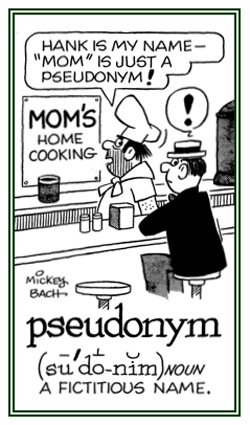pseudo-, pseud-
(Greek: false, deception, lying, untrue, counterfeit; used as a prefix)
2. A mineral that has the crystalline form of another mineral rather than the form normally characteristic of its own composition.
2. A descriptive term referring to a deceptive or an irregular form.
2. Conversion into a false or deceptive form; by transformation, or forced into an abnormal formation.
The presence of these stinging Pseudomyrma ants protects the acacia trees from leaf-eating enemies.
Before maturity, the large acacia thorns are filled with pith and covered by hard, outer walls. When mature, the ants gnaw an entrance hole into one of each pair of thorns and remove all of the soft pith.
The entrance is made near one of the tips. Within the paired thorns, the ants establish their colony and begin rearing their young, well protected by the hard shell-like walls.
It would seem as if the tree had purposely provided these slender little ants with a safe home and apparently, this is true, since the ants pay their rent by protecting the leaves from leaf-eating insects; especially, leaf-cutting ants which are able to defoliate a tree in one night.
Not only does the acacia provide snug homes for its standing army of Pseudomyrma ants; it also furnishes food for them.
At the base of each leaflet-bearing twig, there is a row of crater-like glands which secrete a honey-like liquid upon which the ants feed.
As a result, the ants have food and lodging, and the acacia, in return, receives protection from enemies like leaf-cutting ants or leaf-eating beetles.
They become alert to the mere smell of a cow or a person, and when their acacia tree is brushed or shaken, they swarm out and immediately attack intruders.
Their stings are very painful, causing a lasting burning and throbbing effect. To brush against an occupied acacia, and thus to acquire a group of vicious, stinging ants on an arm or a leg, is a sensation very much like walking into a large nettle plant.
2. A name erroneously applied to some other species than that to which it properly belongs: Some people believe that it is a pseudonym to call children "kids" because it has been a term for young goats, foxes, antelopes, etc. before it was applied to humans.




